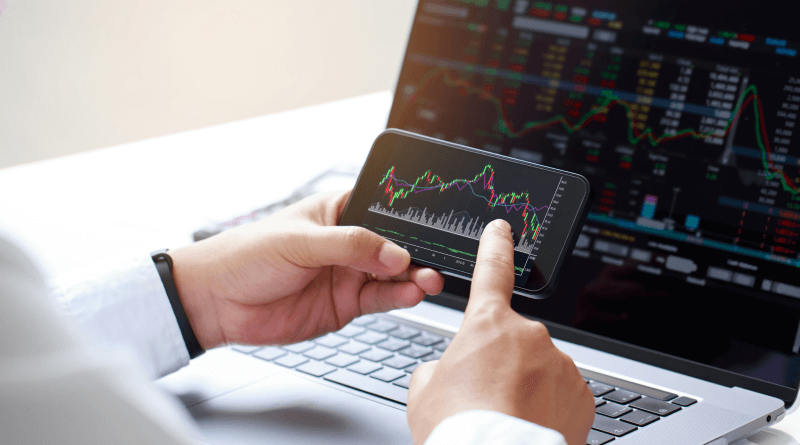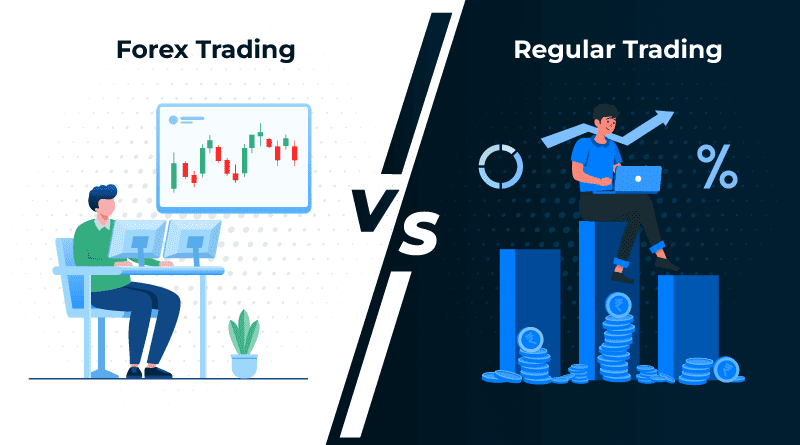If you are interested in diversifying your investment portfolio, trading with forex medium and stock trading are two major trading options for doing the same.In today’s world, investing and trading have become more accessible than ever. Technology has made it possible for anyone with an internet connection to buy and sell assets from the comfort of their own home.
Two popular types of trading are Forex trading and stock trading. Both of these types of trading involve buying and selling assets to make a profit, but they have some fundamental differences.If you are unsure about the difference between forex trading and stock trading, this blog is for you.
What is Forex Trading?

Forex trading, or foreign exchange trading, involves buying and selling currency pairs. Traders try to book profit from the fluctuation in exchange rates between different currencies. Their trading with forex resources helps them to earn a higher ROI. For example, if you believe that the value of the Indian rupee will rise against the U.S. dollar, you would buy the INR/USD currency pair. Conversely, if you think that the Indian rupee will fall against the dollar, you would sell the INR/USD currency pair.
The forex market is the largest financial market in the world, with an average daily turnover of $6.6 trillion. It is open 24 hours a day, five days a week, which makes it very convenient for traders in different time zones. The forex market is decentralized, which means that there is no central exchange where all trades take place. Instead, trading is done through an electronic network of banks, brokers, and other financial institutions.
As a general rule, forex markets operate based on supply and demand for currencies; the higher the demand, the higher the price. The demand and supply chain are similar features in both forex vs stocks comparisons. While the price changes constantly, deciding which way it will go is a difficult thing. The value of the currency may rise significantly or drop as well.
Related: Advantages of Using Forex VPS Hosting for Trading Activities
What is Stock Trading?

Stock trading involves buying and selling stocks, bonds, commodities, and other assets on a centralized exchange. In India, the two most prominent exchanges are the Bombay Stock Exchange (BSE) and the NIFTY. When you buy a stock, you are buying a small portion of the share in a company. If the company does well, it earns a profit. The profit is the dividend monetary amount, which is divided among all the stockholders according to the number of stocks they have purchased. Your profit in the stock market depends on the stock you hold.
If the company is performing well and you have large stocks invested, you’ll surely earn more profit. However, if the company is not performing well and you have a large number of stocks, you are more likely to incur a heavy loss.
The stock market has a staggering $200 billion traded every day on average, considerably less than the average of forex trading but still a notable amount.
Stock trading hours are from Monday to Friday and to know about duration and timings, you can research on the internet. Apart from this, there is a Muhurat trading option for traders where on Diwali eve they can trade for a fixed duration.
Now, let’s understand the difference between stock trading and forex trading. Because of this there is a huge debate about “what is forex trading vs stock trading?” and why is it so.

Key Differences Between Forex Trading and Stock Trading
While making the comparison, it all starts with Forex vs stocks, and understanding the key differences between the two helps you to decide and start your trading.

Volatility:
Volatility in forex trading vs stock trading deals with the frequency of the high fluctuations between the two. Volatility in forex trading is generally higher than in stock trading trading. The prices of currency pairs can fluctuate rapidly and unpredictably, leading to both large profits and losses. In contrast, stock trading tends to be less volatile and more predictable. With predictable price movements, you can easily make a judgment and invest in the stocks.
Leverage:
While learning the difference between forex trading and stock trading, you must understand the concept of “leverage.” Leverage in trading forex vs stocks refers to the permission of the borrower. For instance, leverage increases your buying power of stocks or currencies as you can borrow money from brokers or mediators in between and return it after taking out your profit.
Forex traders can use leverage to control a larger amount of money with a smaller investment. In this example, a trader can get up to $100,000 with only a $1,000 investment by using a leverage of 1:100. It’s one of the biggest benefits of trading forex. Profits or losses can be larger as a result, which can both be a benefit and a risk.
In contrast to FX trading, stock trading typically provides leverage, but at a reduced degree. You can borrow money from your broker to trade stocks, typically up to 50% of the purchase price. Please keep in mind that there are two sides to leverage. Even though it might bring in huge gains, it can also result in sizable losses.
Accessibility:
Accessibility in forex and stock trading refers to the potential and ease of reaching the platforms where the trades can be performed. Forex trading is more accessible than stock trading, as it can be done from anywhere with an internet connection. Even the platforms tend to be more user-friendly, focusing on ease of use and basic order execution. Additionally, forex trading requires less specialized knowledge and equipment.
In the stock trading market, a trader needs access to a centralized exchange platform, which may not be available in some parts of the world. Moreover, the platforms can vary in complexity, with some offering advanced features and technical analysis tools that can’t be accessed without proper technical expertise.
Market size:
While understanding the difference between forex trading vs stock trading, people primarily look at market size or market value. Market size in the trade market refers to the trading volume of individual transactions.
Trillions of dollars are traded on the foreign exchange market (forex) every day, making it the biggest financial market globally. It has a higher trading volume, with smaller individual transactions typically focusing on short-term speculation and hedging in currency exchanges.
On the other hand, stock trading is not as large as the forex market, and it has a lower trading volume with larger individual transactions. Due to lower trading volume, it usually ranges from short-term trading to long-term investing.
Related: What is MetaTrader VPS?
Forex Trading Vs. Stock Trading: Which Is More Profitable?

The type of trading that is right for you depends on several factors, such as your goals, risk tolerance, and experience.
Both of them offer equal benefits. If forex trading gives traders the benefit of currency appreciation. Whereas, stock trading gives you a decent return in the form of midcap, small-cap and other index investments.
However, in both, you have to possess a certain amount of risk. So, always take the guidance of stock market experts. These investments are subject to market risk. Therefore, your capital will be at risk in Forex and stock trading.
To make forex trading easier and smoother, MilesWeb has to offer Forex VPS hosting to traders. They offer the same to streamline trading operations. With their Forex VPS servers, users can run MT4 and MT5 platforms with a minimal latency rate.
So far you have read about Forex and stock trading, and now it’s your final call as to whether trade or not. But always consider the right trading infrastructure and platforms that MilesWeb offers. With their higher SSD NVMe storage and unmetered bandwidth, traders will not get speed or trading performance issues. Besides, 24×7 technical support from MilesWeb is always there to answer queries.
Forex vs Stocks: All FAQs Answered
Is forex trading and stock trading good for beginners?
Both forex and stock trading can be tough without prior experience and knowledge. It is advisable to have some basics cleared before starting the trades. Read our blog for detailed knowledge. For beginners, stock trading is a safer option. It has a lower risk than forex if done cautiously, but still requires research, knowledge, and potentially higher capital.
Are forex trading and stock trading the same?
No, there’s a huge difference between forex trading and stock trading. In stock trading, a trader buys tiny pieces of companies, usually called shares and the profit depends on the overall performance of the company and the shares purchased. On the other hand, forex trading involves the buying and selling of currencies in pairs.
Are day trading and forex trading the same?
Both day trading and forex trading involve buying and selling within short timeframes, but they’re different. In day trading, a trader buys or sells stocks or options within a single day with small price movements. In forex trading, a trader aims to profit from exchange rate fluctuations within a limited period.
Is Forex trading better than the Indian stock market?
The choice between forex trading and Indian stock trading depends on your individual goals, risk tolerance, and financial situation. Forex trading carries higher risk due to leverage and volatility, requiring constant attention. The Indian stock market offers slower but steady growth, with lower risk and less demand for active monitoring.
Which is more risky, forex or stocks?
While both forex and stock trading come with their potential share of risks, forex generally takes the top spot. Forex trading gives a high level of volatility where a trader can use leverage (borrowing money) to potentially earn bigger profits, but at the same time, it also magnifies the loss chances.
Without proper knowledge and trading guidelines in forex trading and stock trading, you can suffer losses.















